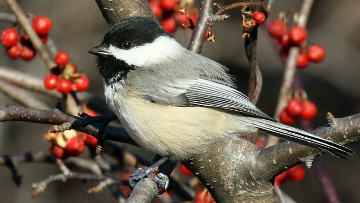Village News

PHOTO COURTESY OF GARRY KESSLER
Black-capped chickadee.
February 21, 2020, Page A3
NATURE NOTES
By Annie Reid
Westborough Community Land Trust
Talking climate change: How you can help
Here in Massachusetts, we’re fond of our black-capped chickadees (Poecile atricapillus) – favorite forest and feeder birds and the state birds of Massachusetts and Maine – but due to climate change, we can no longer take them for granted. As the climate warms, their range will shift northward, eventually enough so we won’t have them here anymore. This news was part of the message from Martha Gach, Ph.D., of Mass Audubon’s Broad Meadow Brook Sanctuary in Worcester, in her recent presentation, “Talking Local Climate Change: How You Can Help,” sponsored by the Westborough Community Land Trust (WCLT) at the Westborough Public Library.
Talking about climate change is key, Martha said.
“Make it part of the everyday conversation. Acknowledge it, normalize it!” To find hope for the future, “break the climate silence!”
How does climate change work? An easy way to understand the process, Martha suggested, is to think of Earth’s atmosphere as a heat-trapping blanket surrounding the planet. As the burning of fossil fuels (oil, coal, natural gas) and other human activities add greenhouse gases to the atmosphere at a fast rate, the blanket gets thicker and traps more and more heat.
The main gases responsible are carbon dioxide (from transportation and other sources), methane (from decomposing food waste, agriculture, and natural gas), and nitrous oxide (from fertilizers and other sources). For 800,000 years, carbon has cycled through the environment, including the land, the oceans, the atmosphere, and living things including vegetation, in a way that kept a balance between the addition and removal of carbon dioxide from the atmosphere. But in the past 120 years, basically since the Industrial Revolution of the 1800s, people have been adding more carbon dioxide to the atmosphere than the cycle removes. As a result, the concentration of carbon dioxide in the air has doubled, “making the blanket thicker.”
What are some local impacts of this change? In Massachusetts, according to Mass Audubon, the average yearly temperature has increased 2.9 degrees (F) since 1895. The growing season is now 11 days longer than it was in 1950. The sea level in Boston Harbor has risen 11 inches since 1922. And Massachusetts has been getting 55 percent more strong storms since before 1958, and they’re getting stronger. Our total annual precipitation has increased 15 percent since 1895.
What about future impacts? By 2100, if we follow the current trajectory of climate warming, Massachusetts will have a climate like that of the Carolinas today (and our black-capped chickadees will have gone farther north). The temperature is projected to increase by 3 to 11 degrees F. The growing season will be 5 weeks longer. Sea level will be 3 to 7 feet higher. Storms as strong as today’s 100-year storms will happen more frequently – every 50 years. (Source: NCICS State Summaries, Fourth National Climate Assessment, and NE CS)
“A hundred years ago, I would have been happy about a warm winter like the one we’re having, but today it makes me anxious,” Martha told the audience.
What can be done to keep climate change from getting worse? In Massachusetts, many cities are at the forefront of implementing measures that reduce carbon emissions to get to “net zero” or “carbon neutral” by 2050. Organizations such as Mass Audubon are demonstrating examples, such as their large rain garden and their new carbon neutral education building at Broad Meadow Brook sanctuary in Worcester.
But what can we, as individuals, do? The average Massachusetts resident’s carbon emissions come from four sources: transportation (35 percent), energy use (29 percent), food we eat (13 percent), and things we buy (23 percent). Martha discussed in detail some actions that individuals can take to reduce their carbon emissions: turning off (or unplugging when not in use) computers, phones, lights, video games, air conditioners; biking or walking when possible; eating less beef; switching to or supporting green energy sources; joining a community organization or board; and especially, talking about climate change with friends and elected officials.
Interested in more information? Watch this video of Martha Gach’s talk (by Westborough TV).
Date index
Month (February)
Common name index
Scientific name index
Category index